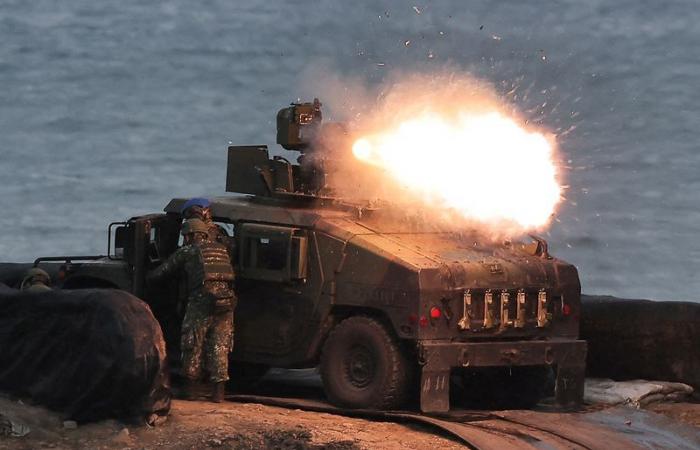Taiwan could show that it takes Donald Trump’s request for “protection” money seriously by quickly concluding large new arms deals, showing that it is not seeking to take advantage of the situation and that it She is determined to show Washington that she is willing to spend to defend herself.
Mr. Trump, who won a second presidential term this week, upset the democratic government of Taiwan, claimed by China, by declaring that Taiwan should pay the United States for its defense and that he had kept away semi-industrial companies. -drivers of America.
“Watch Taiwan on the defense side to try to start committing it to a big arms package – to do something important, very important,” Rupert Hammond-Chambers, president of the U.S. -Taiwan Business Council which helps negotiate defense trade between Washington and Taipei, adding that this could be done in the first quarter of next year.
“But think of it as a down payment, a way to get attention,” he said. “They will stack several large platforms and large ammo purchases.
The United States is already Taiwan’s main arms supplier, although Taiwan has complained of an order backlog of some $20 billion. A new order for missile systems, worth nearly $2 billion, was announced last month.
Taiwan, whose government rejects Beijing’s sovereignty claims, has come under repeated military pressure from China, including a new round of war games last month.
Taiwan’s Foreign Ministry, in a written report to lawmakers Thursday, said China could try to test the United States during the presidential transition by holding new exercises, launching cyber attacks or resorting to other forms of psychological warfare.
A former U.S. official said he believes it is “very likely” that Taiwan will quickly try to negotiate a major arms deal with the United States to gain support from the Trump administration and counter any lingering tendency to believe that Taiwan defrauded the United States on semiconductors.
“They will want to solidify their loyalty quickly to lock in Trump’s interest,” the person said of Taiwan, speaking on condition of anonymity so they could speak freely.
Taiwan’s defense pact with Washington ended in 1979 along with formal diplomatic relations, so the country does not directly pay for U.S. forces to be based on its soil, unlike Japan and South Korea. South.
Taiwanese Foreign Minister Lin Chia-lung on Thursday avoided answering reporters’ questions about what form the U.S. protection money might take, but he told lawmakers that spending on defense, which currently represents around 2.5% of GDP, would increase.
“The trend is increasing,” he said.
Taiwan’s defense ministry referred Reuters to comments made by Deputy Defense Minister Po Horng-huei to parliament on Wednesday, which said Defense Minister Wellington Koo had made very clear that Taiwan’s determination to defend itself would never change.
“It is our responsibility to maintain stability across the Taiwan Strait,” Po said.
TAIWAN FRIENDS
Several people tapped for high-level positions in the new US administration are strong supporters of Taiwan, including former Secretary of State Mike Pompeo, who after leaving office called for the establishment of formal diplomatic relations with Taiwan, and former national security adviser Robert O’Brien, who visited Taiwan last year.
On Wednesday, Mr. O’Brien thanked Taiwanese President Lai Ching-te on Twitter for his congratulations to Mr. Trump, which pleased Taiwanese authorities, although Mr. Lai’s office said he was not not expected to speak with Mr. Trump.
A Taiwan-based security source, also speaking on condition of anonymity because of the sensitivity of the issue, said that if people like Mr. O’Brien or Mr. Pompeo were given top positions , this would be “fantastic” for Taiwan, but that Taiwan also needed to show that it took defense spending seriously.
“Trump asking for protection money is probably the push Taiwan needs to really increase its defense spending,” the official said, adding that a new arms deal over the new year would be a great way to show Trump that that’s what he’s going to do.
Mr. Trump gained supporters in Taiwan during his first term, first by speaking to then-President Tsai Ing-wen shortly after her election and then through arms sales , visits by cabinet members to Taipei and a tough stance on China.
Vincent Chao, a spokesman for Lai’s presidential campaign and a regular visitor to the United States, said all possible candidates discussed publicly for Trump’s secretary of state and defense secretary positions are considered “favorable in Taiwan.
“When it comes to Trump, people say it’s about what he does, not what he says,” Mr. Chao said, referring to Mr. Trump’s comments on Taiwan during the campaign. “The Taiwanese people don’t need to worry. We should have confidence.”






